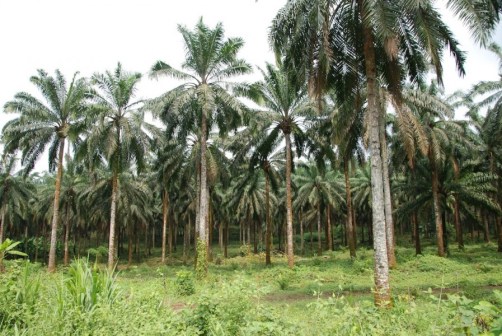An Agro-based Non-Governmental Organisation, Stocks and Minas Agricultural Advocacy Network Africa (SMAANA) in collaboration with the Central Bank of Nigeria (CBN) on Saturday inaugurated a 10,000 hectares oil-palm plantation in Kogi.
Mr Joseph Idoko, President of the NGO while inaugurating the plantation in Amaka, Igala-Mela/Odolu Local Government Area of the state, said the initiative was to complement government’s effort at ensuring food sufficiency.
Idoko said that the SMAANA initiative was to bridge the gap between demand and supply of palm oil as well as generate more than 60,000 jobs.
He said that the recent ban on palm oil importation had placed enormous responsibility on the local farmers to meet the shortfall.
Idoko said that the NGO had decided to leverage on the opportunity to revolutionise palm oil production in the country.
According to him, every household of about five persons consume 96 litres of palm-oil annually and we have 24 branded vegetable oil in the market and each brand contains 75 per cent palm oil.
He said that a hectare could employ six permanent workers adding that the 10,000 hectares would employ over 60,000 permanent workers.
Idoko said that his organisation had secured 18 sets of Forestry Mulchers at a cost of N1.6 billion from Anozer Energy Global, Florida, U.S.A. and would be shipped to the country soon.
He added that SMAANA had also designed a Tree-crop expansion model known as Oil-Palm Estate Partnership Investment Development Initiative (OPESIDI) to complement the government’s policies for the growth of tree crops in the country.
The Central Bank of Nigeria (CBN) Governor, Godwin Emefiele commended SMAANA for the initiative to revolutionise oil palm production, adding that the bank would give necessary support to the project.
Emefiele, represented by Mr John Alfa, the Deputy Managing Director, Finance Department, Lokoja branch office, said the CBN in its quest to ensure food security, had initiated various agricultural projects and disbursed more than N30 billion to support the Anchor Borrowers Scheme and Cluster Farming.
According to him, with 2.5 metric tons annual demand for palm oil and 1.3 metric tons of internal production, leaving a shortfall of 1.2 metric tons for importation offers many opportunities for employment.
In his remarks, the Onuh Amaka, Chief Noah Uyah said Amaka and its neighbouring communities were happy with the development, adding that it would change the fortune of the people.
Uyah commended the CBN and the NGO for the project, adding that the communities were happy to donate the 10,000 hectares of their land for the project.

